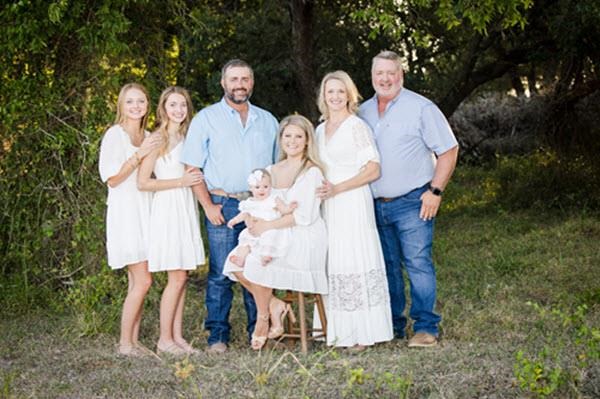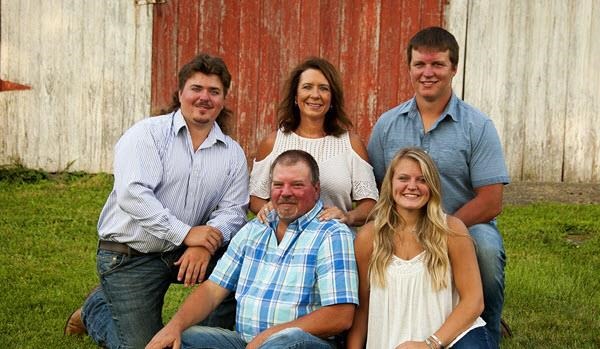Glaze and her family farm in Texas; the Orschells are from Indiana
By Diego Flammini
Staff Writer
Farms.com
Mother’s Day is this Sunday (there’s still time to get a gift, though), and all this week Farms.com has been conducting Q&As with farm moms.
The questions range from describing those first few moments of holding a newborn to some of the hardest parts about motherhood.
Laura Glaze (LG), and her husband Josh grow rice and soybeans, and raise cattle in Wharton County, Texas near the Gulf Coast.
Together they have three children – Clay (28), Emily (18), and Madelyn (17).
“Clay is quiet and reserved and is such a hard worker,” Glaze told Farms.com. “He has a degree in agronomy from Texas A&M University, and that’s such a big help on the farm. “Emily is going to be a dual major at Texas Tech in the fall. She’s mild-mannered, our peacekeeper and has a huge heart. And Madelyn is finishing her junior year. She is more high-spirited, full of life and energy and keeps us on our toes.”
Glaze is also a farm grandma to a granddaughter.
And Mindy Orschell (MO) farms with her family in Brookville, Ind., raising corn, soybeans, hay, and beef cattle.
With her husband Greg, they have three kids – 27-year-old Josh, 25-year-old Jacob, and 23-year-old Jenna.
“We have one that is very detail oriented, and two that are laid back and go with the flow,” she told Farms.com. “While they each have unique personalities, one constant in all three is they are all hard workers who are driven to see the farm succeed and continue.”
In addition, Orschell has the title of farm grandma to two grandkids.
Farms.com: Where were you when you found out you were pregnant for the first time? How did it make you feel?
LG: Clay is my stepson, so my first pregnancy was with Emily. I was teaching school at the time and had the day off because it was Good Friday. My husband was on a backhoe job not too far from the field and I went to tell him. I was in total disbelief and shock because it took us a long time to have children.
MO: We had a miscarriage first, so when we found out we were pregnant the second time, I was very nervous. We were excited for this next chapter, but unsure if we were really qualified to raise a human.
Farms.com: Describe the feeling of holding a newborn for the first time.
LG: It’s overwhelming in the best way. It’s the miracle of childbirth and that this life came from you.
MO: Pure bliss. I never knew I could love a tiny human so much.

The Glaze family (Left to right: Madelyn, Emily, Clay, Clay's wife Celia holding Kathleen, Laura and Josh.) Captions by Cricia photo.
Farms.com: What’s the best part about being a farm mom?
LG: I get to be part of everything my kids do and are passionate about. They all grew up in 4-H and FFA and we’re fully engaged in that. I get to see them reach for their goals and achieve their dreams.
MO: Without a doubt, sharing experiences with our kids. Everything we do on a farm is hands-on learning. Watching my kids and grandkids see a calf being born for the first time never gets old, or eating the first vegetables from the garden that they helped raise. Showing them that life is bigger than just themselves, it's about taking care of animals and crops to provide for others.
Farms.com: What’s the hardest part about motherhood?
LG: Wanting to be the best at every stage of their lives. And even as they grow into adults, I worry in a different way or I pray for them in a different way.
MO: I think this answer changes depending on the stage you are in. When they were young, I put pressure on myself to live up to the unwritten expectations to have a perfect house and family. As they got older, for me, it was trying to give them as many experiences as I could. With three kids, a farm and full-time job, life was crazy, but so fun! Now with grown kids, the hardest part is knowing my job of raising them is done and trying to find my new role.
Farms.com: What’s a misconception people have about motherhood?
LG: That you have to have all the answers. You’re doing what you think is best at that time. It may not always be successful, but those decisions come with the best intentions behind them.
MO: That it's all roses and sunshine. Sometimes motherhood is pushing your kiddos when you know what they are capable of, or telling them no, or loving them through a bad decision they made.
Farms.com: What’s your mom’s name? What are some special memories you have with her?
LG: My mom’s name is DeeAnn. She was always active in our lives and did her best to be engaged with our activities even if they were outside of what she knew or enjoyed.
MO: My mom’s name was Barbara Malone Fish. She was a kindergarten teacher for 33 years, so we got to spend our summers together working in the garden, and then canning and freezing the harvest each year. Bottom line, we saw her working hard and molding lots of kindergarteners over the years, but she always spent lots of time teaching me during the summers.

The Orschell family.
Farms.com: What’s one lesson you learned from your mom that you try to teach your kids?
LG: My mom always told us to think before we speak and to not always say what we think. And she reminded us not to be spiteful.
MO: To see the good in things and all people. Things happen for a reason and according to God's plan. And to be positive!
Farms.com: How has parenthood changed you?
LG: It reminds me how precious life is, to take a step back and to breathe. Mom life is so rushed that you forget to enjoy some things because the next thing is already coming. But next thing you know those babies are out of diapers and going off to high school and it catches you off guard.
MO: I believe I'm more compassionate and flexible. Also, it has driven me to practice what I preach!
Farms.com: What’s one thing all parents have in common no matter where they are in the world?
LG: Wanting the best for their kids.
MO: Love for their children.
Farms.com: What’s one piece of advice you have for new moms?
LG: Try to love every minute of your kids as you can because they grow up so fast. And even though it happens right in front of you, you’ll feel like you’ve missed it.
MO: Give yourself lots of grace. Social media has distorted mom life in my opinion. Don't compare yourself and follow your gut. Let your kids see you working and work alongside them in the barns and in the fields. There is no better way to develop hard-working kids and to truly bond with your child than to sweat together bailing hay or shoveling manure out of the barns.
Farms.com connected with seven other farm moms from across the U.S. and Canada this week.
Trish Cook, who farms near Winthrop, Iowa, says holding a newborn felt natural and like a miracle at the same time.
Gail Donkers and her family grow cash crops and raise livestock in Fairbault, Minn.
She told Farms.com the best part about being a farm mom is watching kids learn to play with the things around them.
Jamie Beyer’s family produces cash crops near Wheaton, Minn.
She advises new moms not to feel guilty when days are hard because not every moment is enjoyable.
Julie McIntosh raises eggs and sheep near St. Mary’s, Ont.
She described finding out she was pregnant as an answer to a dream.
Angela Cammaert raises crops, cattle and children in Elgin County, Ont.
For her, the best part about being a farm mom is watching her kids figure out how to correct mistakes.
In Del Bonita, Alta., Sheila Hillmer raises beef on her family farm.
A lesson she tries to teach her kids is that hard work pays off.
And Josie Pashulka raises livestock on her family’s Derwent, Alta. farm.
The hardest part about motherhood, in her opinion, is giving advice in today’s world.
Farms.com would like to wish all moms a Happy Mother’s Day this weekend!